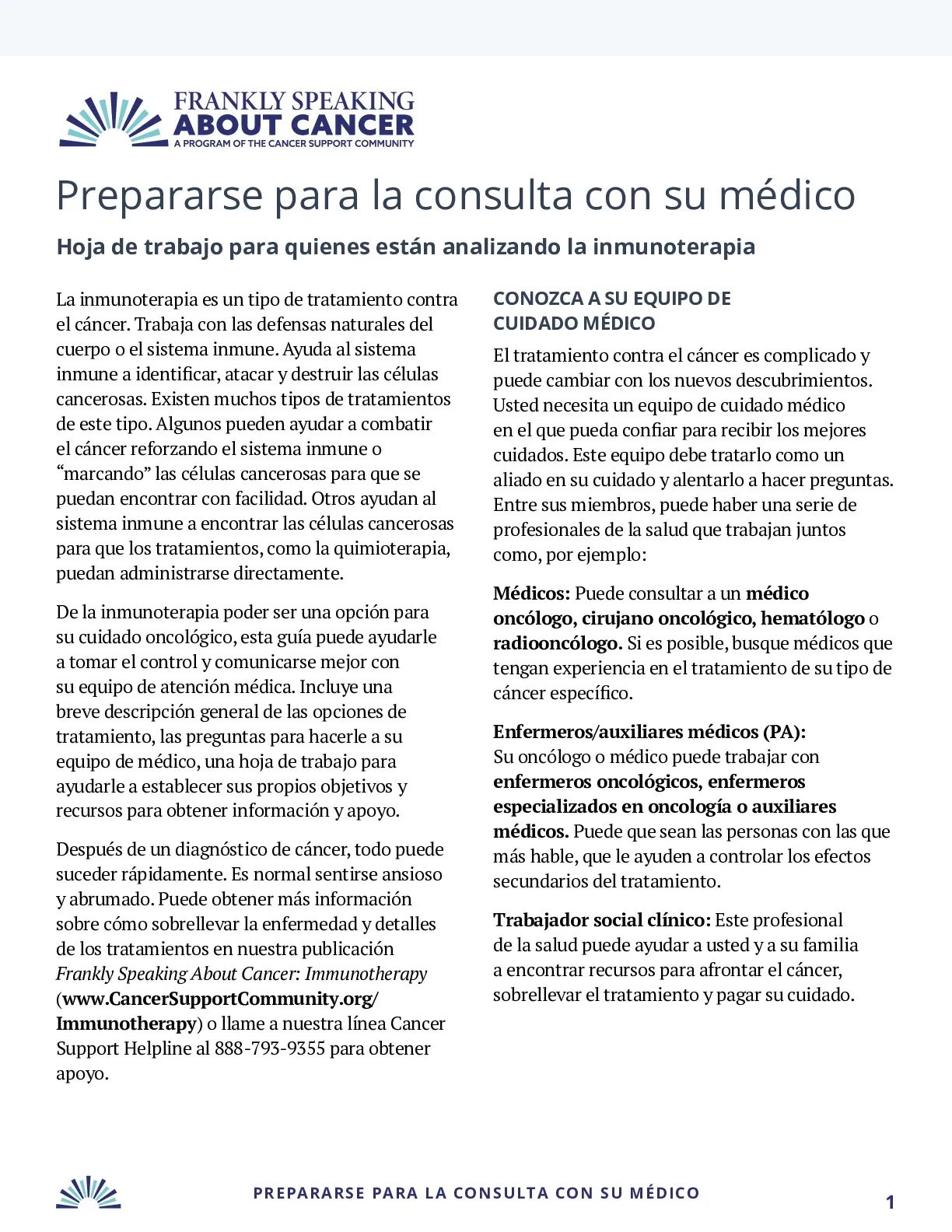Immunotherapy for Cancer: Is it Right For You?
Table of Contents
Immunotherapy is a type of cancer treatment that uses the body’s natural defenses (immune system) to identify, attack, and kill cancer cells. The immune system is designed to attack any cell it sees as unhealthy or abnormal.
Today, there are multiple kinds of immunotherapy treatments. They help fight cancer by:
- Boosting the immune system. A “revved up” immune system can be better at fighting the cancer.
- “Marking” cancer cells so that your immune system can see them better to find and destroy them. This keeps the cancer from being able to hide from the immune system.
- Helping the immune system find cancer cells and delivering treatment (like chemotherapy, radiation, or even T cells) directly to the cancer cells.
What Is Immunotherapy?
This video will help you understand what immunotherapy is, how it works, and if immunotherapy is an option for you. Have a concern of your own? Please call our Cancer Support Helpline to talk with an experienced counselor or navigator:…
How is Immunotherapy Given?
The use of immunotherapy is rapidly increasing as more immunotherapies are approved to treat people with more types of cancer. Most immunotherapy is given using an IV infusion (through a vein). You may receive immunotherapy in a doctor’s office, in a clinic, or as a day patient in a hospital. Different immunotherapies are given on different schedules. Some may be given in combination with other therapies or with a different immunotherapy.
Is Immunotherapy Right for Me?
Most people who get immunotherapy today have cancers that are advanced or metastatic (stage 3 and 4). Their cancers have either returned and spread after initial treatment or were diagnosed in an advanced stage. Some immunotherapy drugs are now approved to treat certain early stage cancers. Researchers are testing immunotherapy in new cancer types and at earlier stages. Some people cannot receive immunotherapy because of serious health problems (like autoimmune disorders) that make it unsafe to take these drugs. Ask your health care team if immunotherapy is right for you.
Types of Immunotherapy

Checkpoint Inhibitors
The immune system has safeguards in place to prevent it from attacking healthy cells. These safeguards are called checkpoints. They slow down or stop the immune system from attacking healthy tissue. Some cancers have learned how to activate these checkpoints to avoid being found and killed by the immune system. They trick the body into turning its own defenses off. Checkpoint inhibitors block these checkpoints, helping the body fight cancer.
Most patients who receive immunotherapy today are on one of two kinds of checkpoint inhibitors: PD1/PDL-1 or CTLA-4 inhibitors. However, not all cancers can be treated with these drugs. Currently, checkpoint inhibitors only work for up to a third of patients who are given them. But that number depends on your cancer type. These drugs may be given in combination with other therapies, such as chemotherapy or other immunotherapy drugs. Researchers are also studying giving checkpoint inhibitors in combination with radiation therapy.
Checkpoint inhibitors have been approved to treat the following:
- Merkel Cell Carcinoma
- Liver Cancer
- Cutaneous Squamous Cell Carcinoma
- Non-Small Cell Lung Cancer
- Small Cell Lung Cancer
- Melanoma
- Kidney Cancer
- Lymphoma
- Bladder Cancer
- Head and Neck Cancer
- Triple Negative Breast Cancer
- Cervical Cancer
- Endometrial/Uterine Cancer
- Esophageal Cancer
- Gastric/Stomach & GEJ Cancers
- Basal Cell Skin Cancer
- Colorectal Cancer
- Mesothelioma
As well as any non-blood cancers that test positive for the biomarkers MSI-high/dMMR or TMB (tumor mutational burden).
What is a Monoclonal Antibody?
Ruby, your virtual community navigator, will help explain what you need to know about monoclonal antibodies and how they are used in cancer treatment.
Checkpoint Inhibitor Side Effects
We tend to think of immunotherapy as “natural”—as our body’s own defense system. However, immunotherapy can still have side effects. These effects are generally different from those caused by chemotherapy or radiation therapy. In many cases, they are not severe and may be short-lived or easy to manage. Less often, side effects can be very severe and even life-threatening.
What Are the Side Effects of Immunotherapy?
This video will help you understand common side effects of immunotherapy, rare side effects of immunotherapy, and additional side effects from combined treatments. Have a concern of your own? Please call our Cancer Support Helpline to…
Common side effects
- Flu-like symptoms (fever, chills, headache, nausea, cough, loss of appetite)
- Fatigue (some people get extreme fatigue) Rashes, redness, or itching
- Pain or soreness
- Muscle or joint pain
- Infections
Less common side effects
- Colitis or other gastrointestinal problems (stomach pain, diarrhea)
- Problems with the thyroid, liver, kidneys, heart, or other glands or organs
- Lung problems (cough, shortness of breath)
- Other serious autoimmune conditions (such as pituitary disorders or diabetes)
Sometimes the side effects do not occur right after treatment is given. They may show up several months later. Little is known at this time about whether there are any long-term side effects. If you are on immunotherapy, it is important to let your healthcare team know immediately if you notice any change in side effects or symptoms. Most side effects can be managed if they are treated early.
Other Monoclonal Antibodies
Checkpoint inhibitors are one type of monoclonal antibody (mAb). Other types let the immune system find and destroy cancer cells using targets that aren’t checkpoints. Still others take radiation or chemotherapy drugs directly to cancer cells. Each mAb is made to find and attach to a specific protein that occurs in cancer cells. Not all mAbs are immunotherapies, some are targeted therapies. Most mAb treatments that aren’t checkpoint inhibitors are used in blood cancers.
Cell Therapies
In cell therapy, the body’s own cells are removed from a person with cancer, taken to a lab, and modified. Once returned to the person, these modified cells can find and destroy cancer cells. The most common form of this treatment is CAR T cell therapy. It is now approved in certain leukemias and lymphomas. It is being tested in several other cancer types.
Researchers are also studying cell therapies called TIL, TCR-T, and CAR NK for other cancers including melanoma, cervical cancer, and blood cancers.
Cytokines
Cytokines have been used for years. They do not target cancer cells like some newer treatment methods. Rather, they work by speeding up the growth of T cells and activating other immune cells, boosting the immune system generally. They do not provide a targeted response like some newer treatment methods. Interleukins and interferon are examples of cytokines that have shown some success in treating advanced melanomas and kidney cancers.
High dose interleukin 2 (IL2) has greatly helped a small percentage of people with advanced melanomas and kidney cancers.
Treatment Vaccines
Cancer Vaccines are designed to “teach” T cells to respond to specific cancer antigens. Currently, there is only one approved cancer vaccine that treats advanced prostate cancer. It is made from the patient’s own white blood cells. These cells are sent to a lab where their ability to recognize and fight prostate cancer cells is boosted. They are then re-infused into the patient.
Researchers are studying possible vaccines for other cancers including brain, breast, cervical, colon, kidney, lung, melanoma, ovarian, pancreas, and blood cancers, among others.
Oncolytic Virus Therapy
Oncolytic virus therapy uses viruses to fight cancer cells. The one oncolytic virus therapy currently approved in the U.S. is used to treat specific types of melanoma. Several other viruses are being tested in clinical trials for cancers such as brain, breast, colon, and pancreas.
What Does It Cost?
Many new treatments, including immunotherapy, are very expensive. Patients who are being treated through a clinical trial may have those costs covered. Talk to your health care team upfront about the financial issues involved in your treatment. Also, talk to your health care plan before beginning treatment to find out what the cost will be. Many treatment centers have resources to help patients obtain insurance coverage or access programs designed to help cover costs of treatment.
Is a Clinical Trial Right for Me?
Be sure to ask your health care team about clinical trials. Clinical trials are research studies to test new treatments or learn how to use existing treatments better.
- A clinical trial may be the only way to get some of the newest, most promising treatments. Talk with your health care team about clinical trial options.
- The U.S. FDA and local review boards oversee all U.S. clinical trials to keep patients safe. Participating in a clinical trial means that you will receive the best available standard of care for your cancer or a new approach that may offer improved outcomes.
- Almost no one receives a placebo or “sugar pill,” and you will be specifically told if this is a possibility.
- If you join a clinical trial, you can leave the trial at any time and continue to get standard treatment by your doctor.
- Every doctor does not offer the same trials. Even if another doctor is in charge of the trial, your doctor may still help with your care.
- Most often, the trial pays the costs of the drug being studied, and your health insurance only has to pay for “standard” treatment costs. However, your health insurance may not pay for everything. Be sure to ask your healthcare team.
Current Immunotherapies by Cancer Type
What Are Checkpoint Inhibitors?
This video will help you understand what checkpoint inhibitors are, how they help the immune system fight cancer, and if checkpoint inhibitors are an option for you. Have a concern of your own? Please call our Cancer Support Helpline to…
Frankly Speaking About Cancer Library
LibraryWould you like a print copy of these educational materials?
We can mail our Frankly Speaking About Cancer pieces to you. Shipping is free for up to 20 pounds.






